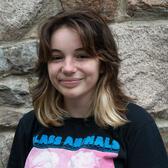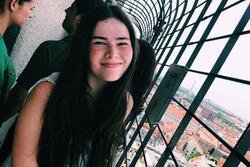We Need Better Holocaust Education
As I walked through the old house where a Jewish family, not dissimilar to my own, had hidden from the Nazis, I had few emotions. I was a seventeen-year-old studying abroad, and I was one of two Jews on my program. While my non-Jewish friends sobbed outside of the Anne Frank House in Amsterdam, I just felt slight annoyance and anger. My friends had only learned about the Holocaust in history class; they had only experienced it through textbooks, educational videos, and Night by Elie Wiesel. I’d been nervous to go inside the museum and the annex. However, I didn’t have the reaction I expected to have. Sitting by the canals after the museum tour, I realized: they will never experience this in the way that I do.
As Jews, we have an altogether different Holocaust education. Many of us learn from our grandmothers, our grandfathers, great aunts, and great uncles. They tell us the story of what they lived through, or what their parents lived through. Some of us may even see Holocaust photos and recognize our own ethnic features in the faces of the imprisoned people in the concentration camps. I knew the story by age eight. I used to cry when I read about it, but by now, I’m desensitized. When I read Night at age 14, I felt a sense of detachment. The generational trauma had become just another constant in my life. Walking the creaky floors in that Amsterdam annex, my non-Jewish friends felt a sharp pain, while I felt only a dull ache. They were realizing for the first time the horror of the event, while I'd been contending with it my whole life.
At my synagogue, seventh graders take a Holocaust studies class during Sunday school. As a madricha, I’ve watched twelve- and thirteen-year-olds have side conversations, do homework, and even scroll through Instagram as teachers lecture about the genocide of our people. Although this may seem disrespectful, they're just kids. It's not their fault; they've been saturated with Holocaust information throughout their lives, so much so that a lecture on the tragedy is old news to them. They have likely discussed the genocide with their families, and even as young as seventh grade, they may be aware of what connects them personally to the Shoah. This is Jewish Holocaust education.
In my secular high school history classes, I’ve watched students learn for the first time what the Holocaust is. I’m familiar with the looks of pity I receive as the token Jewish kid in the class. I know the looks of horror and sometimes even disgust when we are shown images of emaciated imprisoned people in the camps. For non-Jewish kids, this is just another historical event, on par with the Boston Tea Party. For me, it's family history. This is secular Holocaust education.
So what needs to change? What place does Holocaust education have in Jewish and non-Jewish spaces? Originally, I wasn't sure why I was so angry after the Anne Frank House tour; but later on, I realized that I wanted my friends to feel this trauma, to help me hold it emotionally, and to not simply feel sad or bad about the people that died. I wish that they were a part of my community in order to understand the impact from the beginning. I was angry that this experience was such a shock to them. To me, this illustrates that we need more thorough Holocaust studies in secular education. If non-Jews had more understanding of what our people went through, it would take a lot of emotional labor off the shoulders of Jewish kids. We wouldn't always have to feel like the odd ones out. While we can't make non-Jews a part of the Jewish community, we can give them the tools to empathize with us through better Holocaust education.
Only 23 states in the US require Holocaust education, which is a glaring issue. I think that the necessity of having Holocaust education at all is to show students what current systems are capable of, the importance of acceptance, and notably, honoring those that were killed. However, even in the states that require it, I think we are going about it wrong. I’ve lived in Wisconsin, where Holocaust studies are required, for my whole life, and I still grapple with a sense of detachment, I still face ignorance and pity, and I still feel anger when the topic is brought up.
More emphasis needs to be put on the resistance and strength of the Jewish people, rather than the tragedies that happened to them. We learn about how they were abused, imprisoned, and murdered, but we don't learn how they fought back. We don't learn how they kept Torah study alive. We don't learn how they continued to pass on our culture to the next generation. Even in strictly Jewish spaces, I don't think we learn enough about our resistance. There is too much repetition of how many people were killed, of what life was like in the concentration camps. While this is extremely important to learn, hearing it over and over again is a lot to hold, especially for kids going through the Holocaust curriculum at their Sunday school. When I learned about the resistance at Warsaw, that was the first and only time resistance had been brought up in my Holocaust education. Learning about Warsaw was an empowering moment for me, and it needs to happen more in Jewish spaces to empower other young Jews. Resistance education would serve another purpose in secular education; when I’m in a non-Jewish space, I don't want non-Jews to feel bad for me. I want them to think about how strong my people are.
As I sat outside of the Anne Frank House on a bright summer day, I knew at that moment that my differences set me apart from my peers. What to them was a sad story was to me generational trauma. However, it doesn't always have to feel that way. By approaching Holocaust education with the purpose of creating an environment of empathy both in Jewish and secular spaces, we can, together, begin to unwind the complexities of our past.
This piece was written as part of JWA’s Rising Voices Fellowship.








Such a great article Sam! I feel the same way! People should be focusing more on empowerment and persistence, than focusing on the hardships people had to go through. Even though learning the sad things is vital.